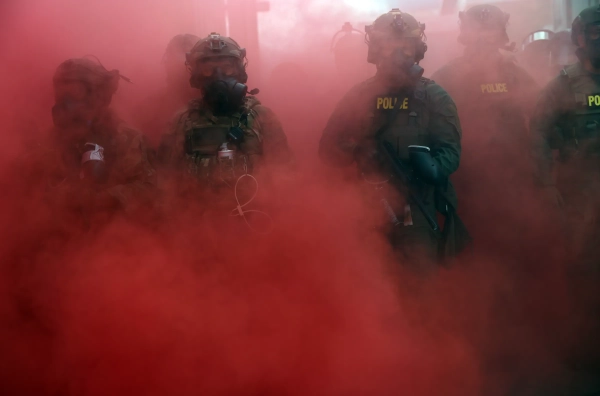
The Senate is moving toward passing a resolution this week to end US involvement in the war in Yemen — in what could be a stunning show of bipartisan pushback against the Trump administration and its support for Saudi Arabia.
The joint resolution, which was introduced by Sens. Bernie Sanders (I-VT), Mike Lee (R-UT), and Chris Murphy (D-CT), calls for President Donald Trump to stop US armed forces from supporting Saudi Arabia in its war against the Iran-backed Houthi rebels in Yemen.
“The Saudi intervention in Yemen has created the worst humanitarian disaster in the world, with millions of people facing imminent starvation,” Sanders said in a statement on Tuesday. “The time is long overdue for the United States to stop following the lead of Saudi Arabia, a brutal regime that recently murdered a dissident journalist and has no respect for human rights.”
If the resolution passes, it will send a strong signal that the Senate is ready to challenge the Trump administration’s coziness with Saudi Arabia and its de facto leader, Crown Prince Mohammad bin Salman (also known as MBS), in the wake of the murder of Saudi journalist and dissident Jamal Khashoggi.
The Senate’s effort is one of several in Congress aimed at rebuking the Trump administration’s embrace of MBS and Trump’s unwillingness to punish him for assassinating Khashoggi, a US resident and Washington Post columnist who advocated for freedom of speech.
Last week, CIA director Gina Haspel briefed senators on intelligence relating to the murder of Khashoggi on October 2. Senators emerged from that meeting resolved that MBS was “complicit” in Khashoggi’s brutal killing.
The fallout from the Khashoggi incident has led lawmakers to reexamine the relationship between the US and Saudi Arabia, including America’s role in perpetrating a three-year war in Yemen that has spiraled into a devastating humanitarian crisis.
Senators also introduced a non-binding resolution last week to condemn MBS for his role in Khashoggi’s assassination. The Senate may also take up a vote on a bill that would suspend weapon sales to Saudi Arabia and impose sanctions on officials who block humanitarian access in Yemen, or who were involved in Khashoggi’s death.
But not everyone in Congress is on board, and the future of this Yemen resolution, and these similar measures is uncertain.
In fact, lawmakers in the House on Wednesday passed a last-minute provision to an unrelated farm bill that would block the GOP-led chamber from considering any Yemen-related resolutions before the end of the year.
The White House has also threatened to veto any such bill that curtails Saudi support, and the administration has pressured senators to vote against the resolution being debated Wednesday, according to the Wall Street Journal.
It’s not clear Congress can ultimately force Trump to alter his Saudi policy. But the mere fact that the Senate is openly debating US military support for the war in Yemen is a sign that the administration’s stance is coming under scrutiny, and that the devastating conflict in Yemen is capturing the attention of lawmakers.
An important — yet incomplete — step toward ending US support for the Saudi-led war
The GOP-led Senate has wrestled with a resolution to end America’s assistance to Saudi Arabia in Yemen before, and defeated it in a close vote in March.
But Khashoggi’s murder helped reenergize bipartisan support, and in November, lawmakers overwhelmingly voted 63-37 to advance the resolution to end US backing of hostilities in Yemen, excluding counterterrorism operations involving al-Qaeda.
As Vox’s Alex Ward has written, the US offers crucial support to the Saudi-led offensive:
The current resolution before the Senate would call on Trump to either cut off all support for the Saudi-led war or, if he wants to continue supporting it, to ask Congress to vote on whether to authorize US military involvement in the war effort. Lawmakers seem unlikely to give the president that authorization if it came to a vote.
During the debate on Wednesday, a bipartisan group of senators also introduced an amendment that would explicitly bar US air refueling of Saudi aircraft involved in the Yemen war.
Reports suggest the Senate resolution is likely to pass, but even if it does, there likely won’t be any real movement on it this year. Congress can, of course, take up the issue again in 2019. A new Democratic majority in the House might ease its passage in that chamber, but the Yemen resolution might face a tougher time in the Senate next year as the GOP increases its majority.
Sourse: vox.com






